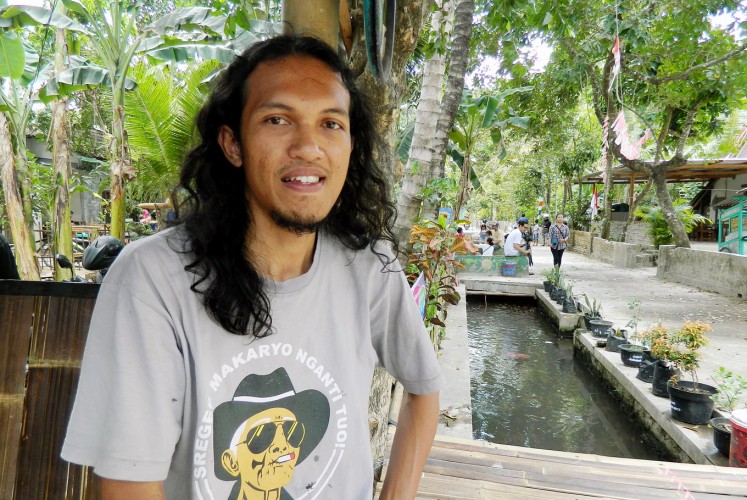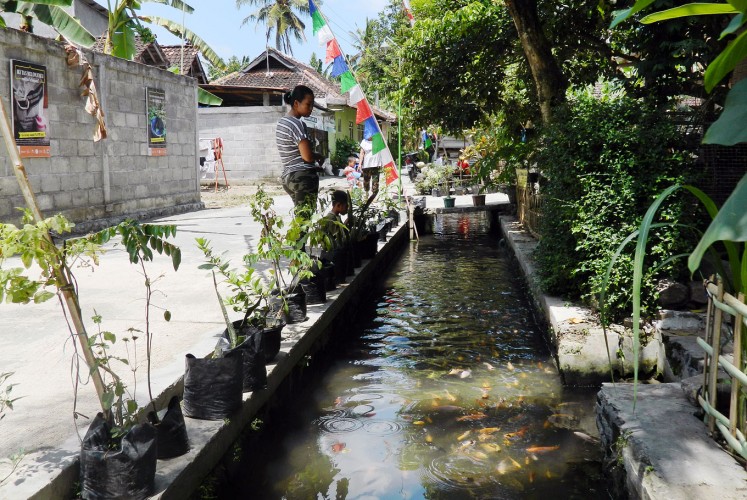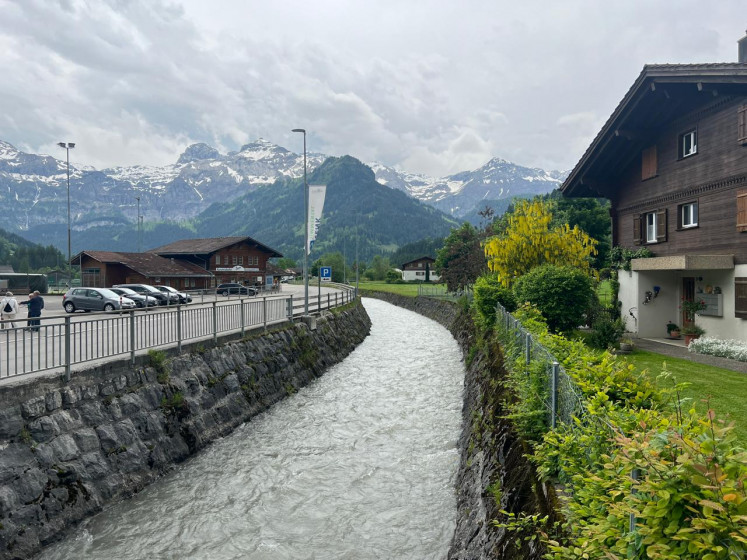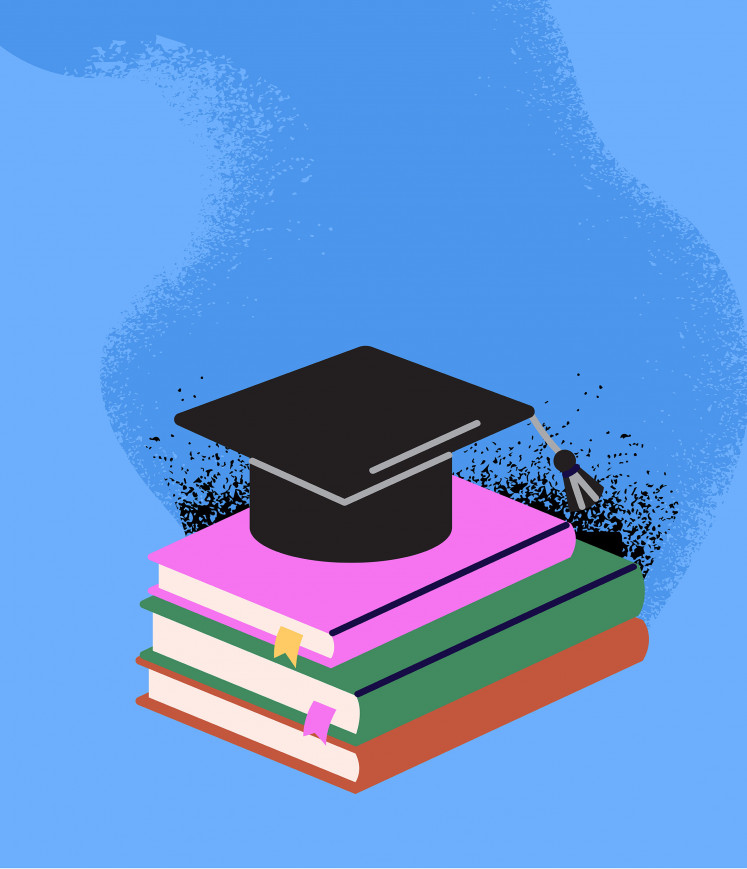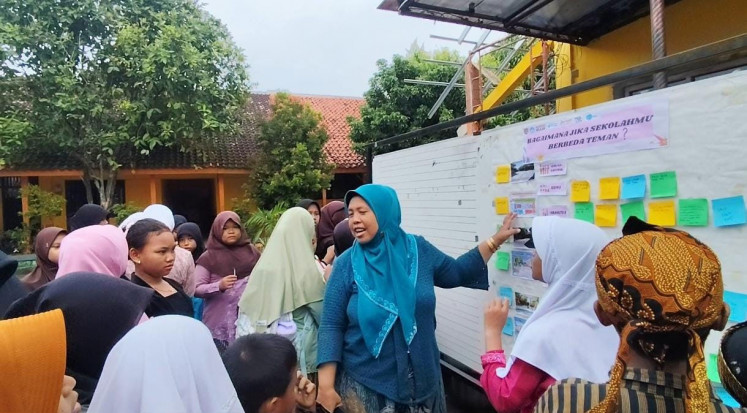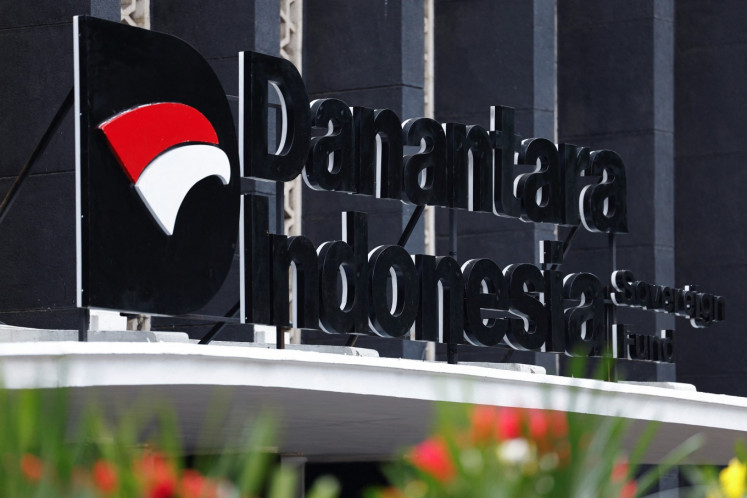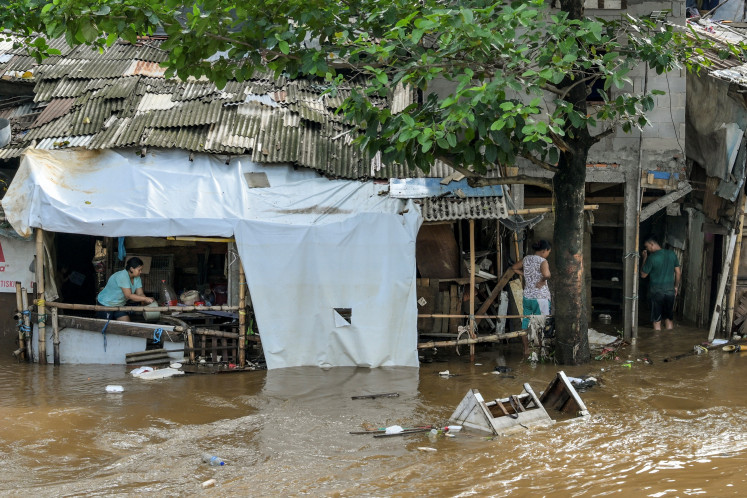Popular Reads
Top Results
Can't find what you're looking for?
View all search resultsPopular Reads
Top Results
Can't find what you're looking for?
View all search resultsVillages drive waste management but waste persists in urban Yogya
Change text size
Gift Premium Articles
to Anyone
T
here is something different about the dykes running through the Singosaren neighborhood of Wukirsari village in Bantul regency, Yogyakarta.
Most dykes, particularly in urban and residential areas on Java, are foul and filled with garbage, but the ones in Singosaren are so clean that even fish live there.
In Wukirsari, local children like to feed the fish in the dykes and a number of adults regularly scrape algae off its walls.
“The residents are now engaged part-time in taking care of the fishes and cleaning the dykes,” said 29-year-old Ari Ahmad Zulfahmi, who lives there.
Ari said the fish ponds were actually irrigation channels that were once treated as places to dump garbage.
The idea to get rid of the garbage arose in June when members of Komunitas Anak Zaman, a local youth community, learned about proper environmental management methods.
“So, we residents agreed to clean the irrigation channels and put young fish in them,” Ari said.
The dykes-turned-ponds, which run a length of 100 meters through the neighborhood, are now home to about 8,000 tilapia (Oreochromis niloticus). The community plans to soon extend the fish ponds to cover a length of 500 m.
Ari hoped the fish farming program would raise residents’ awareness of maintaining cleanliness and actively involve them in environmental management.
“It is also a means of public education because the water [from the dykes] is also used for irrigation and crops, and [its quality] will be affected if they are polluted,” he said.
The dykes’ upstream source is the Opak River, one of Yogyakarta’s four major rivers. The other three are the Bedog, Winongo and Code rivers, which flow down to Bantul regency and provide a source of irrigation for about 200,000 hectares of agricultural lands.
Gadjah Mada University’s (UGM) recent research on industrial technology shows that the rivers had been heavily polluted by waste, mostly household waste.
Through the youth community, Ari has provided the area with garbage cans and posted murals and posters with messages on protecting the environment from waste.
These messages are apparently working in raising the community’s environmental awareness.
“People used to dump garbage into the dykes and now no longer do it,” said Muthohar, a Singosaren resident.
“Other neighborhood units in the area are planning to replicate our program,” the 60-year-old added.
The Wukirsari concept has been applied in at least two other locations, in Klaten and Klodran.
In Klaten, Central Java, 76-year-old retiree Joko Sucipto uses the irrigation dyke in front of his house for cultivating a variety of fish species. The dyke is clean because the water comes from Umbul Pluneng spring, located not far from his home.
Klodran villagers in Karanganyar, Central Java, have been breeding fish in their irrigation dykes since 2008, first cleaning the dykes and sowing tilapia spawn. Today, around 20 fish breeders have managed the approximately 600-m dyke-ponds.
Other youth communities like the one in Wukirsari have also been emerging in and around Yogyakarta to mitigate the waste problem that has polluted the local rivers.
One of these emerging communities is the Association of Yogyakarta River Communities (AKSY), with over 16 affiliate communities in the province.
AKSY chairperson Endang Rohjiani said the organization, which was set up in 2015, had been engaged in river education, campaigns and advocacy in its search for solutions.
“This is a forum for sharing, motivation and strengthening the grassroots role in solving river issues,” she said.
Well conserved: A Wukirsari villager stands by a dyke that was once filled with garbage, but is now home to over 8,000 tilapia. A local waste management initiative has raised the community’s awareness of environmental protection and urged residents to actively care for their water sources. (JP/Ainur Rohmah)Such issues, said Endang, concerned not only waste management but also mining runoffs and makeshift riverbank settlements, which were interrelated and required a holistic solution. The government, she said, should toughen its legal instruments and existing rules to control public behavior.
Endang also mentioned AKSY’s Mundur Munggah Madep Kali (M3K) movement, which advocated that riverbank settlements should move backward at least 3 m from rivers and be located higher than the riverbanks.
“We also suggest that their homes face the rivers as a symbol of appreciation for the streams, so that they won’t dump garbage there because they face their house yards,” she said.
AKSY has also been running its River School program in Yogyakarta since 2015, which has been adopted by nearly all regions across the archipelago.
“Through the school we promote student understanding about rivers, waste and water management and pro-environment campaigns in the media,” said Endang.
While offering better understanding and environment-friendly solutions, the community river management programs can also provide benefits to local economies.
Nevertheless, implementing the programs on a larger, urban area scale could be a challenge.
Yogyakarta director of the Indonesian Forum for the Environment (WALHI), Halik Sandera, said the Wukirsari concept could not be implemented in heavily urbanized zones, which faced various kinds of waste filling their dykes and gutters.
“The government, the people and all relevant parties should make improvements and seek breakthrough solutions to resolve the waste issue,” he said.
Halik said the waste problem in Yogyakarta’s urban areas had been increasingly worrying, with heaps of garbage frequently seen in its rivers and sewers. He added that Yogyakarta’s waste problem was mainly caused by overpopulation as well as increasing public consumption.
No less than 240 tons of waste is produced daily in Yogyakarta alone, a figure that rises to 300 tons at weekends. Of the total waste produced, about 10 to 15 percent are piling up along riverbanks.
“Community empowerment is seen as the best way of handling the waste problem, but even this solution has its weaknesses,” said Halik.
The empowerment program is among those in the city’s overarching 3R (reduce, reuse, recycle) waste management campaign.
“In practice, not all waste can be recycled, such as liquid waste from households,” Halik said.
To tackle liquid waste, he said, the Yogyakarta city government needed to promptly finish the Waste Water Disposal (PAL) installation in Sewon, Bantul.
Since 2012, the government has also accelerated the establishment of waste banks, which were highly expected to solve the problem of solid waste. Waste banks provide a source of income whereby people exchange their waste for money, yet this scheme also has its downsides.
“I’m afraid this may urge [people] to deposit more and more waste, and consumption will simply soar,” Halik said.
Halik stressed that to make a serious effort to combat the waste problem, Yogyakartans needed to shift to a more efficient, practial lifestyle to minimize their consumption of goods.
“For instance, the simplest way is to take their own bags when they go out shopping to local markets or department stores,” he said.


